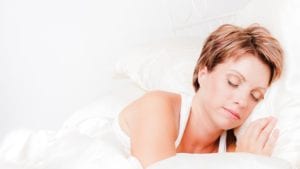Written by Taylor Woosley, Science Writer. 56-day supplementation with 200 mg of valerian extract (2% total valerenic acid) significantly improved sleep quality, sleep time, sleep efficiency, and reduced anxiety compared to placebo.
 Insufficient sleep leads to reduced stress resilience, decreased quality of life, mood disorders, and cognitive, memory, and performance deficits1. Sleep disorder is a highly prevalent disease that disrupts the normal circadian rhythm and includes insomnia and obstructive sleep apnea2. Various studies have shown the worldwide prevalence of insomnia at 10-30%, some showing a prevalence even as high as 50-60%3.
Insufficient sleep leads to reduced stress resilience, decreased quality of life, mood disorders, and cognitive, memory, and performance deficits1. Sleep disorder is a highly prevalent disease that disrupts the normal circadian rhythm and includes insomnia and obstructive sleep apnea2. Various studies have shown the worldwide prevalence of insomnia at 10-30%, some showing a prevalence even as high as 50-60%3.
Valeriana officinalis extract, functioning as an antioxidant agent, could be beneficial for reducing oxidative stress-associated insomnia complications4. Valerian extract (VE) contains over 150 chemical constituents including alkaloids, terpenes, organic acids, and their derivatives5. Valerian acts to inhibit sympathetic nervous system activity via the neurotransmitter GABA6.
Shekhar et al. conducted a randomized, double-blind, placebo-controlled clinical trial to analyze the efficacy of VE on sleep in subjects with sleep complaints. Objective sleep evaluations consisted of use of polysomnography (PSG), electroencephalograms, electrocardiograms, etc. performed in a clinical laboratory setting. Sleep parameters were measured via the Pittsburgh Sleep Quality Index (PSQI) questionnaire, wrist actigraphy bands, and PSG. Subjects were adults aged 18 to 50 years, with a BMI of 18.5-29.9 kg/m2, with a PSQI score of 5 or above, an insomnia severity index score of 14 and below, and a Beck Anxiety Index (BAI) score of 15 and below experiencing mild insomnia symptoms without any comorbidities. Participants were randomized to either the VE group or placebo. The VE group received capsules containing 200 mg of valerian extract (2% total valerenic acid) and the placebo group consumed capsules containing microcrystalline cellulose. Participants were informed to consume one capsule 1 hour before bedtime at the same time every day for a 56-day intervention period.
All subjects partook in study visits including a baseline visit, randomization visit, and follow-up visits on days 3, 14, 28, and 56. Participants were informed to wear a wrist actigraphy device for three consecutive nights to evaluate sleep latency, total sleep time, and sleep efficiency at baseline, days 3, 14, 28, and end of intervention. Overnight PSG was conducted on day 1 and day 56 in a subset population of 40 subjects. Additionally, subjects completed the Epworth Sleepiness Scale (ESS) and the visual analogue scale (VAS) for feeling of waking up refreshed at baseline, days 3, 14, 28, and end of intervention.
72 subjects (n=37 in VE, n=35 in placebo) were included in the final analysis. No significant differences were noted between groups regarding mean age and BMI. Significant findings of the study are as follows:
- A significant decrease in PSQI total score was noted for the VE group compared to placebo from baseline on day 14, day 28 and day 56 (p<0.05). Furthermore, subdomain analysis of PSQI shows that VE subjects had significant improvements for subjective sleep quality and sleep latency on days 14, 28, and 56; sleep duration and habitual sleep efficacy on days 28 and 56; and daytime dysfunction on day 14 compared to placebo (p<0.05).
- Findings of wrist actigraphy assessment show that the VE group had a significant decrease in sleep latency (p<0.05), actual sleep time (p<0.05), and sleep efficiency from baseline on day 3, day 14, day 28, and day 56 compared to placebo.
- The VE group experienced a significant decrease in anxiety score from baseline compared to placebo on day 14, day 28, and day 56 (p<0.05).
- The VE group had a significant improvement in the waking up refreshed VAS score compared to placebo from baseline, day 28, and day 56 (p<0.05).
Results of the trial show that valerian extract significantly improved overall sleep quality and the feeling of waking up refreshed, while lowering anxiety in subjects with mild insomnia. Valerian extract may be a beneficial supplement for people experiencing sleep disorders. One study limitation is the use of subjects with already higher sleep latency issues.
Source: Chandra Shekhar, Harshith, Lincy Joshua, and Jestin V. Thomas. “Standardized Extract of Valeriana officinalis Improves Overall Sleep Quality in Human Subjects with Sleep Complaints: A Randomized, Double-Blind, Placebo-Controlled, Clinical Study.” Advances in Therapy 41, no. 1 (2024): 246-261.
© The Author(s) 2023
Click here to read the full text study.
Posted March 27, 2024.
Taylor Woosley studied biology at Purdue University before becoming a 2016 graduate of Columbia College Chicago with a major in Writing. She currently resides in Glen Ellyn, IL.
References:
- Shinjyo N, Waddell G, Green J. Valerian Root in Treating Sleep Problems and Associated Disorders-A Systematic Review and Meta-Analysis. J Evid Based Integr Med. Jan-Dec 2020;25:2515690×20967323. doi:10.1177/2515690×20967323
- Zhao M, Tuo H, Wang S, Zhao L. The Effects of Dietary Nutrition on Sleep and Sleep Disorders. Mediators Inflamm. 2020;2020:3142874. doi:10.1155/2020/3142874
- Kim RE, Mabunga DF, Kim HJ, et al. Novel Therapeutics for Treating Sleep Disorders: New Perspectives on Maydis stigma. Int J Mol Sci. Nov 23 2022;23(23)doi:10.3390/ijms232314612
- Soltani A, Bahrami F, Bahari Z, Shankayi Z, Graily-Afra M, Sahraei H. The effects of Valerian on sleep spindles in a model of neuropathic pain. Sleep Sci. Apr-Jun 2021;14(Spec 2):133-139. doi:10.5935/1984-0063.20200110
- Bruni O, Ferini-Strambi L, Giacomoni E, Pellegrino P. Herbal Remedies and Their Possible Effect on the GABAergic System and Sleep. Nutrients. Feb 6 2021;13(2)doi:10.3390/nu13020530
- Halson SL, Shaw G, Versey N, et al. Optimisation and Validation of a Nutritional Intervention to Enhance Sleep Quality and Quantity. Nutrients. Aug 25 2020;12(9)doi:10.3390/nu12092579
